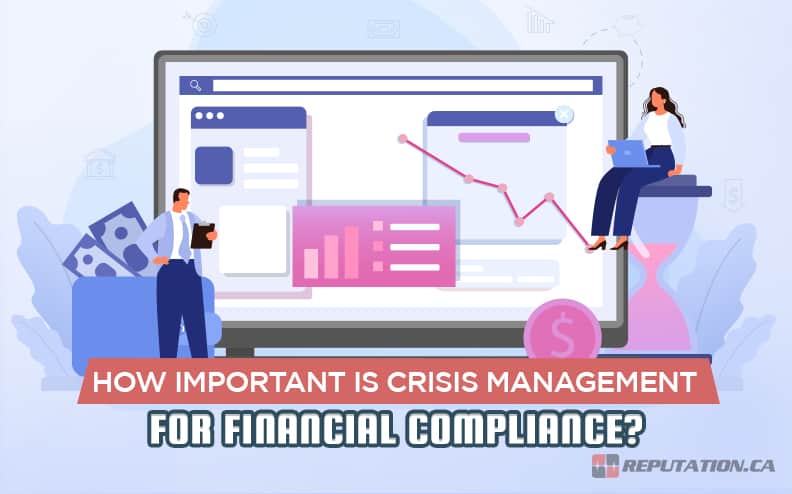It is common for situations to escalate beyond what was originally expected. Finding the right response is more important than ever in a world where the truth is considered precious. Public relations has become a critical, albeit delicate, field in which specialists can address public and government concerns about their industry.
Unfortunately, some situations that require a PR response are so fragile that they can be categorized as crises. This has spawned a subtype of public relations communication called crisis communication, where the most severe circumstances are addressed. Crisis communication enables us to manage crises as they occur and minimize the fallout. That said, crisis communication is still beholden to the other aspects of public relations.
In addition to trying to protect our image, we must remain compliant with federal and state statutes to remain legally righteous in our efforts. One of the most important regulations in modern society is financial compliance for the banking industry. Institutions that handle large quantities of money for their clients are held to an especially high standard since those funds are essential for the people who store them.
These high standards have subjected financial institutions to additional scrutiny, making their public relations a more complicated process. Because of this extra scrutiny, financial institutions that want to remain compliant might need crisis management tactics.
What is Crisis Management?
The phrase “crisis management” is a special term used in the public relations industry that involves highly volatile situations that require a delicate touch to resolve. Specific language and tactics are necessary to address high-tension situations and resolve the issue without exacerbating it. High-tension situations mean the public response and outcry are more likely to escalate the longer the issue persists or if the wrong thing is said.
Therefore, crisis management teams employ communication tactics to try and generate the best solution with minimal blowback. While it is impossible to please everyone and resolve a situation without lasting damage, crisis communication tactics minimize the damage so the entity responsible can eventually recover its reputation.
Crisis communication requires the management team to collect information about the event, the people involved, and the consequences. This means the team is fully informed and can factor in every detail before responding. The team disseminates the data and works collaboratively to determine the best solution and how to execute it effectively.

If a situation mandates a crisis response, it has likely escalated beyond what it normally would have been. Alternatively, crisis management is necessary when a company or individual makes a catastrophic error affecting most of their audience or consumer base.
Finding an effective crisis management team is difficult since you need qualified and talented public relations experts and reputation management staff. Professionals of that nature can be difficult to locate, but we will discuss that later.
Regardless, these professionals will use all the available data to formulate a public response to the situation causing trouble. All this is to say that crisis management is one of the most important public relations concepts in the industry and is employed by countless organizations and individuals. The question is: what relevance does crisis management have for financial institutions?
Do Financial Institutions Use Crisis Management?
The modern world runs on money. Without the proper funds, we cannot acquire basic goods, secure housing, power our homes, or even feed ourselves. While this system has been built upon by our ancestors trading goods and services, we now use theoretical currency backed by precious metals and gems.
Keeping all our money in our homes is seldom a good idea since a thief could enter our homes without our knowledge and take what is ours with no way of recovering or replacing it. That is why financial institutions like banks allow us to store our money and precious items in their facilities, which are more secure. Unfortunately, there is no such thing as a perfect solution since these financial institutions are susceptible to infiltration and error.
When a financial institution is compromised, it can cost its clients their entire savings despite the institute’s assurances when signing up. Fortunately, most financial institutions insure the funds they oversee, so replacement is seldom an issue. Despite funds being replaced, the idea that the institution they trusted could be breached is enough to drive clients away. From that point forward, clients will question whether that institution is secure enough to continue using or if they would be better off elsewhere.

The same principle applies to financial institutions caught in a scandal, such as the misuse of client funds. Scandal is even more destructive since it demonstrates to the clients that the institution will actively steal from their clients for personal gain. This loss of faith can devastate a financial institution that operates on client trust and volume.
Public relations, specifically crisis management, is critical to financial institutions at risk of a breach. Crisis management even has limited use following a scandal, such as embezzlement, if the scandal is localized to a small demographic in the institution. If the president of a bank were to be caught stealing money from client accounts, the company would likely never recover.
Crisis management and communication are also important since federal regulations limit what a financial institution is allowed to tell people. Essentially, a financial institution cannot issue a misleading or outright false statement when discussing the funds their clients entrusted to them. It also means the entity cannot issue false statements to the federal government when referencing the sums they manage or the quality of their service. These laws, known as financial compliance laws, work to keep financial institutions honest.
What They Cannot Say
To comply with financial and public relations laws, financial institutions must be careful about what they say. Using a financial institution generates a specific trust that the institution must honor. Attempting to deceive or mislead the client with dishonest or vague terminology violates that trust. As a result, crisis communication employed by a financial institution’s crisis management team must not employ these misleading terms.
To remain compliant, they also cannot use generic terms that might misrepresent the quality of their services to potential clients. This applies to general statements and advertisements but is also essential when drafting crisis responses to major events.
The most obvious exclusion to crisis communication is making promises they are clearly unable to fulfill (i.e., doubling the stolen funds as compensation). It is also important not to make claims of grandeur or use terms like “greatest” or “only.” Such claims are made despite the opinions of clients and citizens who might feel otherwise. It also serves as a false advertisement since most financial institutions can do the same things, the only difference being the specific contracts they offer clients. While this might seem unrelated, adding terminology like this to a crisis response could earn you the ire of federal entities.

For example, in the United States, the Securities and Exchange Commission can launch an investigation when a statement uses this flawed terminology. If the SEC finds you guilty of violating the restrictions in place, you could face any of the following punishments:
- Fines
- Delisting
- Trading Halts
Other potential punishments depend on the infraction’s severity, but the circumstances vary. Ultimately, curating a crisis response is a delicate task that cannot employ unauthorized terminology. Most importantly, you cannot falsify your statements to report less money stolen or more money present than what is really there.
Misreporting profits and savings is highly illegal in the United States and Canada, and both countries have federal organizations that will investigate the matter. Issuing a statement requires careful consideration and evaluation in the best of circumstances, which is why crisis management experts take an even more cautious approach.
Another important, albeit obvious, restriction is that you cannot single out a client’s private financial information. Any statements released must be generalized and cannot specify a client’s personally identifiable information or how much of their funds were taken or remain. Doing so violates that client’s right to privacy and is a federal offense to disclose.
Fortunately, there is a correct way to issue a crisis response statement that remains compliant with federal regulations. Following the restrictions outlined here is only the first step, but the rest involves ensuring the statement issued is as effective as possible.
How to Issue an Effective Crisis Response
When a public relations issue officially becomes a “crisis,” recovery is extremely difficult since the outrage likely extends far beyond the scope of normal complaints. In most cases, crises only arise when the entity needing public relations assistance makes a critical error. For financial institutions, this means the organization lost money, and the clients are reasonably upset.
Once the issue reaches the crisis response team, there are certain criteria they must meet if they want the response to be effective. First and foremost, ensuring any proposed statement remains compliant with the associated laws is essential to an effective statement. As previously mentioned, failing to do so will only incur the federal government’s and your clients’ wrath. Aside from this, your crisis response team must consider the vulnerabilities most likely to affect a financial institution:
- Regulation changes that might alter the way you are expected to handle your clients’ funds.
- Media coverage that might exacerbate the situation with hyperbole and speculation.
- Previous negative marks on your reputation.
- Workforce issues such as high employee turnover or system errors.
- Crises affecting partnered firms and subsidiaries.
These main points must be addressed in any statement your crisis management team issues since missing one will frustrate clients whose concerns align with them. These details help determine the content of the statement and what measures will be employed to correct the mistake. For example, a data breach requires an overhaul of your institution’s firewalls and digital security measures. Making it clear in the statement what steps will be taken to accomplish this will reassure your clients that you take the issue seriously, though it will not absolve you completely.

In addition to what is in the statement, the next major issue is dispersing it in the most effective manner. Fortunately, this has become one of the easiest public relations and reputation management tasks. We live in an era of social media and streaming content that enables us to reach thousands with a single post on the internet. Crisis management has followed this trend and allowed companies and individuals to post their responses online to maximize the spread. Fortunately, no mandates prohibit you from posting your crisis response online, so you can freely launch the effort from your organization’s Twitter or Facebook account.
The biggest hurdle to overcome is acquiring a staff of specialists equipped to handle crisis response. Not every organization or financial institution can host an in-house public relations team. The good news is that they do not have to.
Take Your Reputation Back!
When a situation gets to a breaking point and becomes a crisis, you must carefully cultivate your response to avoid worsening the situation. This is doubly true for organizations handling large quantities of money for their clients. Given how essential money is for survival in modern society, it is common for people to be fairly aggressive when their savings are compromised.
Crisis response only becomes more complicated when trying to comply with legal statutes in place to protect consumers. That said, the restrictions in language are the most complicated aspect since it is easy for people to misspeak or misinterpret a message. That is why having a reliable team on your side is essential when trying to navigate crises. Unfortunately, not everyone can maintain a crisis response team, but you can overcome that thanks to 3rd party firms.

We at Reputation focus on reputation management and public relations services. We realize how badly a reputation can be damaged during a crisis and work tirelessly to ensure the damage is mitigated. We can post on your social media and clean up any statements to keep them compliant with Canadian law. If you are dealing with a crisis, visit our website today and take your reputation back!











